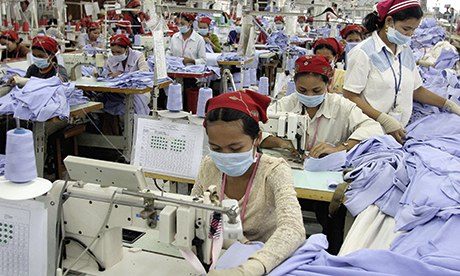Kevin Pooniah
The Guardian
Cambodia's government says its workers will be shielded from abuse, but doubts linger over key welfare issues
Cambodian women working in a garment factory earn about $75 a month, but as maids in Singapore they can make around $360 a month. Photograph: AFP/Getty
Thol Srey Mach is one of 400 women taking part in a pilot scheme that is sending Cambodian domestic workers to Singapore.
There are more than 200,000 foreign domestic workers on the island, and if the trial goes well it could open the way for a new source of labour to sate the affluent city-state's appetite for household help.
With that in mind, Srey Mach, 26, and dozens of other young women have been preparing by scrubbing floors, bathing plastic babies and brushing up on their English at a Cambodian recruitment centre.
The alternative to going overseas for many of these women would be working in a garment factory – a job that pays about $75 (£47) per month.
Srey Mach, who has worked in Malaysia, can expect to earn about $360 a month in Singapore, agents say, though her salary will ultimately depend on "market forces", with no guaranteed minimum wage .
In 2011, the Cambodian government stopped sending domestic workers to Malaysia after a series of rights abuses, including confinement, beatings and sexual exploitation emerged. Two Cambodian agencies participating in the Singapore scheme were allegedly implicated in some of those cases.
The Cambodian government has said it believes its workers will be better protected in Singapore. But rights groups point to large placement fees and a lack of guaranteed rest days as potential welfare issues.
Although Singapore has recently mandated a weekly off-day for maids, employers are allowed to pay workers extra in lieu of a rest day if they agree. For an extra $15 a week, Srey Mach says she won't take a day off: "I don't know what I would do on an off-day. We want to work more so we can get more money ."
Cambodian workers are appealing to Singaporeans to pay the placement fees, which other source countries, such as the Philippines, insist employers bear. Singaporeans complain that they already have to pay $213 a month in taxes – a "maid levy" – as well as a $4,030 bond to have a household worker.
The Cambodian women will have almost all of their salaries deducted during their first six months of work, to repay a $1,930 loan taken out to cover agency fees. If the worker returns home prematurely, she will still be tied to the loan.
In September, the Manila-based Association of Licensed Recruitment Agencies to Singapore (Alras) stopped sending domestic workers to Singapore in protest against salary deductions and placement fees, which are illegal under Filipino law.
Since April 2011, Singaporean law has set a two-month cap on fees that local agencies can deduct from a worker's salary. But despite the laws, some Singapore and Filipino agencies have continued to deduct salaries for up to eight months, said Lucy Sermonia, president of Alras, which represents 110 Filipino agencies. "It is high time we think about the welfare of the household service workers," she said.
Singapore's ministry of manpower told the Guardian it had taken a "firm stance against excessive recruitment fees", with heavy penalties for offenders. "We urge [agencies] to comply with requirements imposed by source-country governments … However, Singapore is not able to enforce the laws of another country," a spokesperson said.
Although workers' welfare has improved over the years, placement fees have increased in the past decade, said John Gee from Transient Workers Count Too, a Singapore NGO. "Before the Asian financial crisis it was pretty normal for Singapore employers to expect to pay for the placement costs," he said. "Then agencies began advertising '$0 maids', and the cost was transferred to the worker – and those costs tended to go up."
The Philippines is the only Asian country to have ratified the landmarkInternational Labour Organisation convention on domestic workers (pdf), which – among other rights protections – bans salary deductions to pay placement fees.
Manila's tough stance has pushed up demand for domestic workers from other countries, Gee said, with Singaporean employers knowing it will be harder to get Filipino workers to forfeit their rest day. "The [employers] know the Filipinos will stand their ground, and they've got government backing," he said. Workers from poorer countries such as Burma are marketed as "docile", he added. "When they talk about workers in these terms, it's a licence to exploit. They won't complain and will do what they are told … There is the same image, I'm afraid, with workers fromCambodia."
Gary Chin, managing director at Nation Employment, an agency in Singapore, said Filipino workers' share of the market had plummeted from 90% two decades ago to 20-30% today because they were "too expensive". "If [employers] want to pay less, they will turn to those countries that still allow their maids to Singapore and are [paying] the placement fees, like Burma, Indonesia and Cambodia," Chin said.


No comments:
Post a Comment